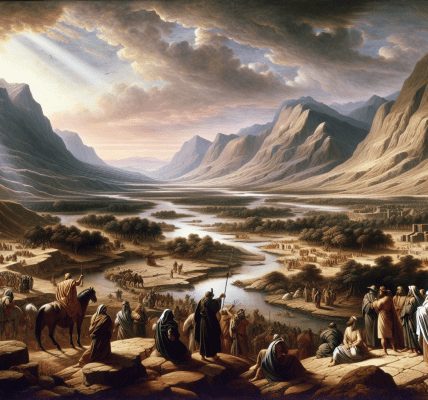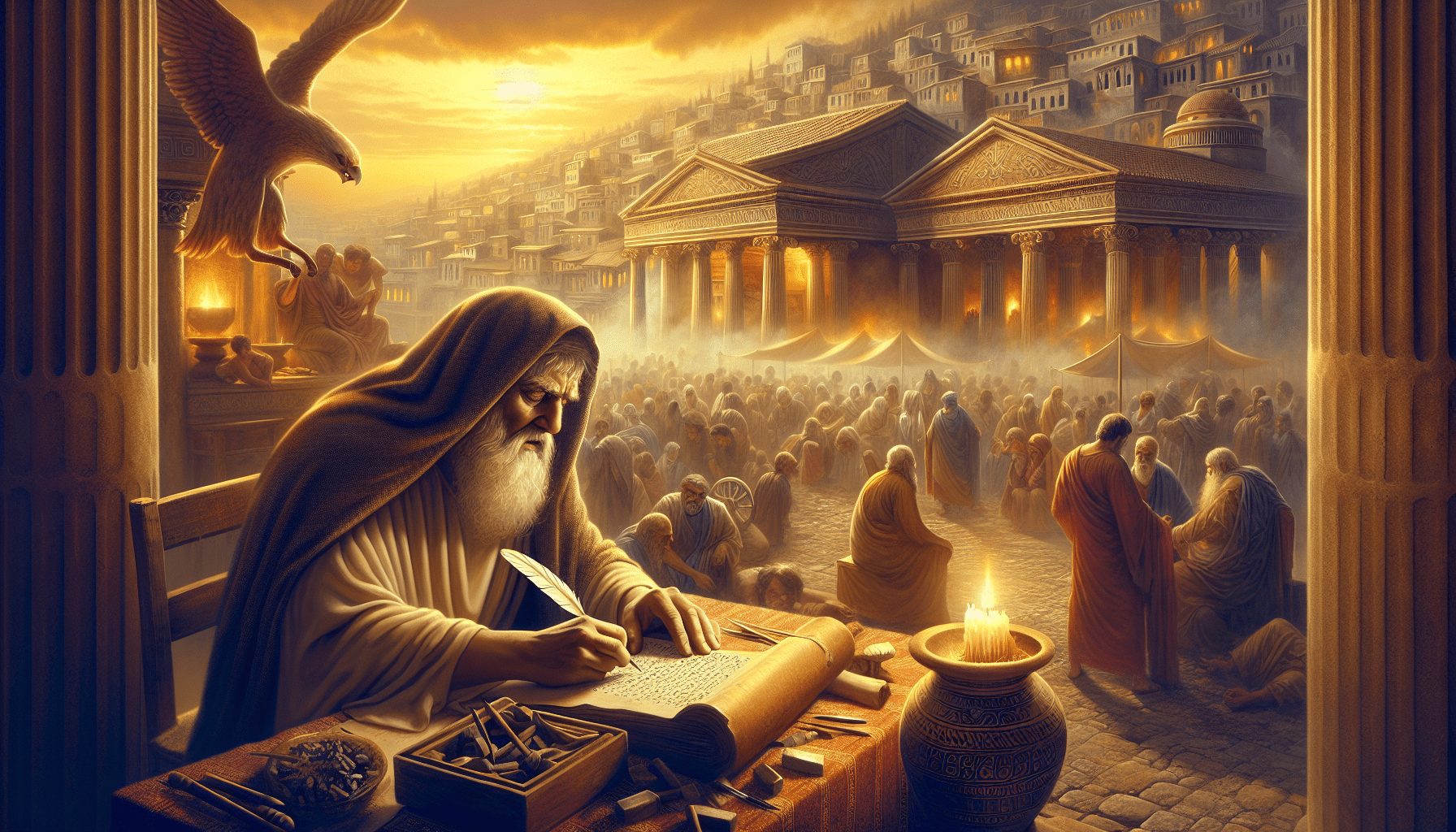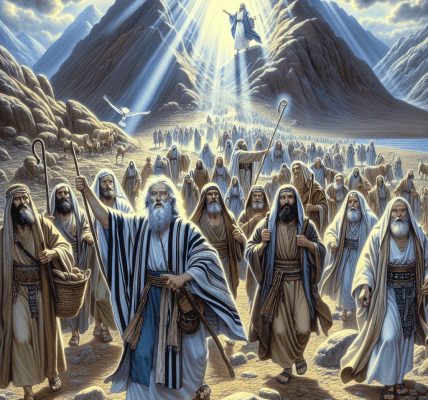**The Flight to Egypt: A Tale of Disobedience and Judgment**
The sun hung low over the ruins of Jerusalem, casting long shadows across the broken walls and smoldering rubble. The Babylonian siege had left the city in ruins, its people scattered or enslaved. Among those who remained was a small, fearful remnant—men, women, and children who had survived the sword, famine, and captivity. They gathered around the prophet Jeremiah, their faces etched with exhaustion and desperation, seeking guidance from the Lord.
Jeremiah, his weathered face lined with years of sorrow and divine burden, stood before them in the courtyard of the ruined temple. The word of the Lord had come to him once more, and he knew that what he was about to say would not be well received. Yet, he could not soften the message.
**”Thus says the Lord of hosts, the God of Israel,”** he declared, his voice steady despite the murmurs of the crowd, **”If you will remain in this land, then I will build you and not pull you down; I will plant you and not pluck you up. Do not fear the king of Babylon, for I am with you to save you and deliver you from his hand.”**
But even as he spoke, he saw the doubt in their eyes. Johanan son of Kareah, a proud and defiant leader among the survivors, clenched his fists. His followers whispered among themselves, their fear of Nebuchadnezzar outweighing their trust in the Lord’s promise.
**”You speak falsely!”** Johanan finally burst out, his voice thick with accusation. **”Baruch son of Neriah has turned you against us, to hand us over to the Chaldeans, that they may put us to death or carry us away captive!”**
Jeremiah sighed deeply, his heart heavy. The people had already made up their minds. They would not listen.
### **The Journey to Egypt**
Despite the prophet’s warnings, the people—led by Johanan and the other commanders—gathered their meager belongings: pots, cloaks, sacks of grain, and whatever livestock remained. With trembling hands, they lifted their children onto their backs and set their faces toward the south, toward Egypt—the land of their ancient bondage, the very place from which God had once delivered their ancestors.
Jeremiah and Baruch were forced to go with them, dragged along against their will. The prophet’s heart ached as they passed through the wilderness, the same wilderness where Israel had once wandered in faith. Now, they fled in unbelief.
After days of weary travel, they reached Tahpanhes, a fortified city in the Nile Delta. The Egyptians, though wary, allowed them to settle, for they saw in these refugees potential servants or mercenaries. The Judeans breathed a sigh of relief, believing they had escaped Nebuchadnezzar’s wrath.
But the Lord had not forgotten.
### **The Prophecy of Judgment**
One evening, as the sun dipped below the horizon, painting the Nile in hues of crimson and gold, the word of the Lord came again to Jeremiah. **”Take large stones in your hands,”** the Lord commanded, **”and hide them in the mortar in the pavement at the entrance to Pharaoh’s palace here in Tahpanhes, in the sight of the men of Judah.”**
Obediently, Jeremiah gathered the stones and buried them at the threshold of Pharaoh’s house, watched by curious and uneasy onlookers. Then, lifting his voice so all could hear, he proclaimed:
**”Thus says the Lord of hosts, the God of Israel: Behold, I will send and take Nebuchadnezzar the king of Babylon, my servant, and he will set his throne above these stones that I have hidden. He will spread his royal pavilion over them. He shall come and strike the land of Egypt, giving those who are for pestilence to pestilence, and those who are for captivity to captivity, and those who are for the sword to the sword.”**
A gasp rippled through the crowd. Egypt, their refuge, would be no safe haven. The very disaster they had fled would find them here.
**”He shall break the obelisks of Heliopolis,”** Jeremiah continued, his voice unyielding, **”and burn the temples of the gods of Egypt with fire.”**
The people stood frozen, their faces pale. They had sought safety in Pharaoh’s shadow, but the Lord had decreed their judgment. Their flight to Egypt had not been an escape—it had been an act of rebellion, and now, they would reap the consequences.
### **The Lesson Unheeded**
Yet even then, some scoffed. **”The Babylonians will not come this far!”** they muttered. **”Jeremiah speaks only doom—where is the God of mercy?”**
But the prophet knew the truth. The Lord had offered them life, and they had chosen death. He had offered them His protection, and they had sought the arm of flesh.
As Jeremiah turned away, his heart grieved, for he knew what lay ahead. The stones buried in the pavement were more than a sign—they were a seal upon their fate. Nebuchadnezzar would come. The sword would follow. And the remnant that had fled in fear would perish in a land not their own.
For the word of the Lord endures forever—and woe to those who refuse to listen.




